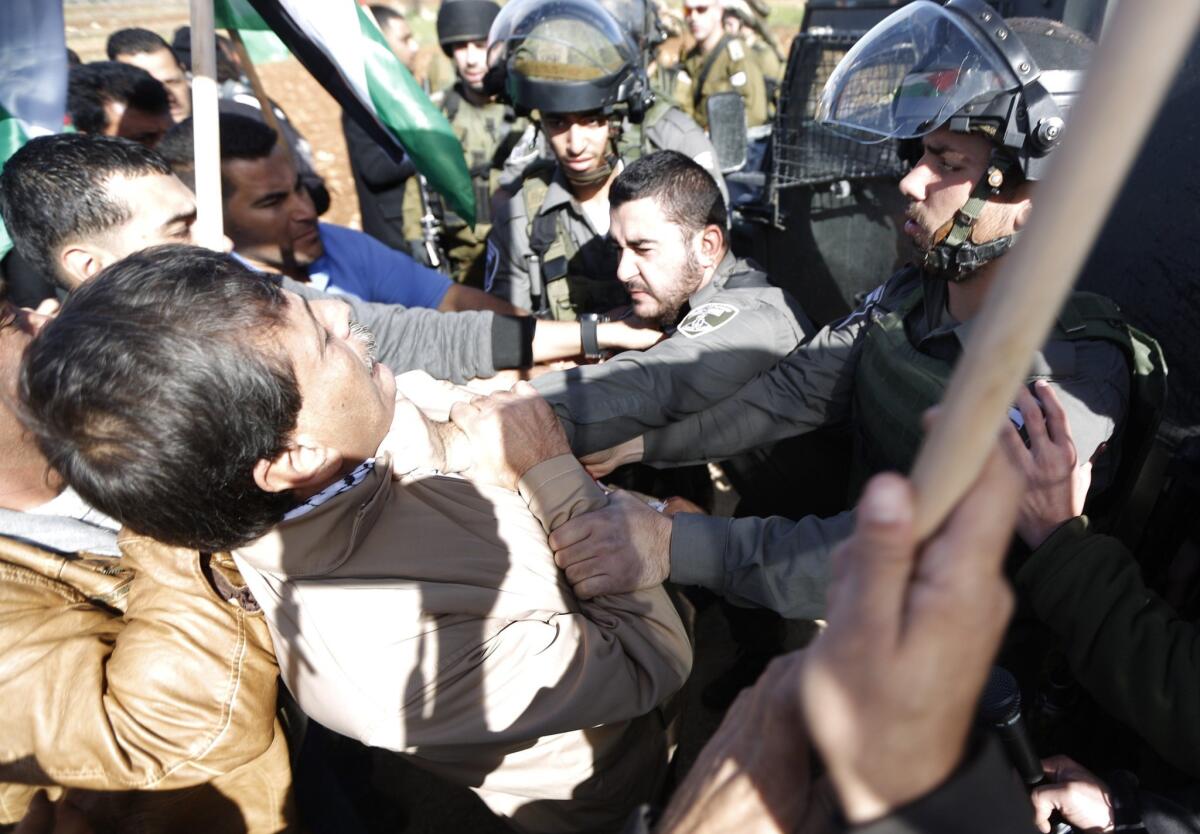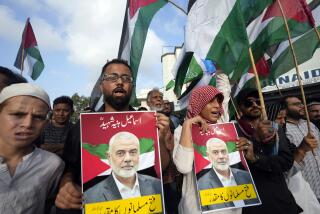Senior Palestinian official dies after scuffle with Israeli soldiers

- Share via
Reporting from Ramallah, West Bank — Palestinian Authority President Mahmoud Abbas condemned a clash Wednesday between Israeli troops and protesters that preceded the death of a senior Palestinian official, calling it a “barbaric act.”
The official, Ziad Abu Ein, was among Palestinians planting olive trees in protest of Israeli settlement near the village of Turmus Ayya, north of Ramallah, when a scuffle broke out between participants and Israeli soldiers trying to halt their path. The soldiers fired stun grenades and tear gas, witnesses said.
Abu Ein, who headed authority efforts against Israeli settlements and the Israeli separation barrier, collapsed at the site and died shortly afterward at a medical facility in Ramallah.
Different accounts said Abu Ein was either struck or beaten by a soldier, or inhaled tear-gas fired at him from close range, or both. Video from foreign and Israeli news organizations at the scene showed a physical altercation in which an Israeli border policeman reached for Abu Ein’s neck.
Abu Ein was recorded saying, “This is a terrorist army that employs terror against the Palestinian people.” He said his group had come to tend to olive trees and was attacked by the Israeli military.
News video showed Abu Ein sitting on the ground, leaning on a boulder with his hand to his chest, before appearing to collapse.
It was not immediately clear what killed the 55-year-old veteran politician and activist. An autopsy and funeral were scheduled for Thursday.
According to a statement from Israel’s military, the incident occurred as troops were using riot-dispersal means to “halt the progress of rioters” into the nearby Israeli settlement of Adei Ad. The statement said military officials were reviewing the circumstances of Abu Ein’s “participation and his later death.”
Jordan also condemned the incident and Prime Minister Abdullah Ensour said the kingdom would dispatch two pathologists to examine the case at the request of his Palestinian counterpart, Rami Hamdallah.
A statement from the Israeli military said senior Israeli and Palestinian security officials agreed that an Israeli pathologist would also take part in the examination.
Federica Mogherini, the European Union’s foreign policy chief, extended condolences for Abu Ein’s death. “Reports of excessive use of force by Israeli Security Forces are extremely worrying,” said Mogherini, who called for an “immediate, independent investigation.”
United Nations Secretary General Ban Ki-moon was “deeply saddened.” Appealing for calm, Ban urged Israel to conduct a “prompt, thorough and transparent investigation.”
Abbas, who called for three days of mourning, convened the Palestinian leadership in Ramallah on Wednesday evening. He said Palestinians would not be deterred from popular resistance against settlements and continuing their struggle “until the occupation ends as soon as possible.”
Abbas did not address reports that the Palestinian Authority was halting security coordination with Israel, but said all options were open. “What happened today was a crime … we cannot remain silent,” he said.
In recent months, Turmus Ayya and the neighboring villages have complained of repeated harassment by residents of Adei Ad, a settlement outpost erected without government authorization. On Wednesday morning, four villages petitioned Israel’s high court through rights organization Yesh Din to evict the settlers.
Israeli Prime Minister Benjamin Netanyahu held security consultations throughout the day and sent a message to the Palestinian Authority through a personal envoy, attorney Isaac Molcho, conveying Israel’s intent to investigate the incident. A statement from Netanyahu’s office said he “pointed to the need to calm the situation and act responsibly.”
Regarded as key in stabilizing the West Bank, security coordination between Palestinian and Israeli forces has been maintained despite the political disconnect. Palestinians are often critical of this coordination.
Last month, Abbas told Arab foreign ministers in Cairo that if statehood efforts did not make progress, he might cease security coordination with Israel and leave it to cope with the results.
The incident comes at a time of deep tension between Israelis and Palestinians, on the heels of violent eruption surrounding holy sites in Jerusalem and a string of attacks that killed 11 Israelis. The new crisis also comes as Palestinians plan to petition the United Nations for recognition of statehood and a two-year deadline for an Israeli withdrawal from Palestinian territory.
Netanyahu plans to meet U.S. Secretary of State John F. Kerry in Rome on Monday for consultations before the U.N. Security Council vote on the matter, scheduled for this month, Israeli media reported Wednesday.
Abukhater and Sobelman are special correspondents. Abukhater reported from Ramallah, and Sobelman from Jerusalem.
More to Read
Sign up for Essential California
The most important California stories and recommendations in your inbox every morning.
You may occasionally receive promotional content from the Los Angeles Times.













